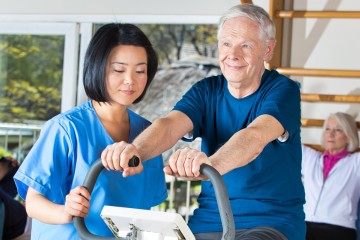Pulmonary Rehabilitation
Pulmonary Rehabilitation is a valuable tool to add to the treatment of individuals living with chronic lung conditions. It’s not a cure, but it’s a powerful program that can dramatically improve quality of life, helping patients breathe easier, become stronger, and increase their independence.
Program participants will meet twice a week for approximately 1 hour with a goal of 12-18 weeks (24-36 sessions). Pulmonary Rehab is covered by Medicare, Medicaid, BCBS, and other insurance companies. There is a lifetime cap of 72 sessions for Medicare patients.
“The primary goals of pulmonary rehab include improving symptoms, restoring functional capabilities, improving self-management skills, and enhancing overall health-related quality of life.”
Donny Bellomy, Director of the Cardio-Pulmonary Department of Newman Regional Health
Please ask your Primary Care Provider or Pulmonologist if you can be referred for the program, as a physician referral is required. Rest assured that your participation is in a safe environment, monitored by qualified clinicians including registered nurses and respiratory therapists.
Connie Coble, RN, BSN
Pulmonary Rehabilitation Case Manager

What is Pulmonary Rehabilitation?
Pulmonary rehabilitation is a medically supervised, comprehensive program tailored to individuals with chronic lung diseases like COPD, asthma, pulmonary fibrosis, and post-COVID respiratory conditions.
The Newman Regional Health program combines exercise training, education, and support to help you:
- Manage your symptoms: Learn breathing techniques and strategies to control shortness of breath, cough, and mucus.
- Increase your strength exercise capacity: Gradually build your strength, stamina, and cardiovascular fitness through safe and monitored exercise tailored to your specific needs.
- Improve your daily living: Discover ways to manage everyday activities with less difficulty and more confidence.
- Boost your emotional well-being: Connect with a supportive community of peers and healthcare professionals who understand your challenges.
Medicare Approved Diagnoses:
- COPD – Chronic obstructive pulmonary disease
- Emphysema (Panlobular, centrilobular, and unilateral)
- Simple, mixed and mucopurulent chronic bronchitis
- Post-Covid 19 conditions affecting respiratory status
Commercial Insurance may also cover:
- Asthma, moderate and severe persistent asthma
- Cystic fibrosis or Pulmonary fibrosis with restriction, manifestations or unidentified
- Other interstitial pulmonary diseases with fibrosis
- Certain types of Pulmonary fibrosis
- Pre-operative conditioning before lung transplantation or lung volume reduction surgery
- Post-op after lung transplantation surgery
Who Benefits from Pulmonary Rehabilitation?
If you have a chronic lung condition that makes it hard to breathe and limits your everyday activities, pulmonary rehabilitation can be a game-changer. It’s particularly beneficial for individuals with:
- COPD (Chronic Obstructive Pulmonary Disease): The most common reason for referral to pulmonary rehab, COPD encompasses many diagnoses including emphysema and chronic bronchitis.
- Post COVID-19 respiratory difficulties lasting at least 4 weeks.
- Asthma: While primarily managed with medication, pulm rehab can help asthmatics improve lung function and exercise tolerance.
- Interstitial lung disease: Characterized by lung scarring, these conditions make breathing difficult.
- Pulmonary fibrosis: This lung scarring condition can benefit from exercise and education to manage symptoms and slow progression.
- Post-surgical recovery: Following lung surgery, pulmonary rehab can help regain strength and function.
What happens in Newman Regional Health’s program?
- Exercise training: Tailored exercises to improve your cardiovascular fitness, muscle strength, and flexibility. These may include warm up exercises, treadmill walking, recumbent stepper, and resistance training.
- Education: Learn about your lung condition, breathing techniques, medication management, and strategies for coping with symptoms.
- Nutritional counseling: Understand how diet plays a role in lung health and receive guidance on healthy eating habits.
- Psychological support: Undergo evaluation of stress, depression, and anxiety levels associated with chronic lung disease and receive information on stress, anxiety, and depression management, and referral to counseling if indicated.

Positive Impact
The benefits of pulmonary rehab extend far beyond just improving lung function. Studies show it can:
- Reduce shortness of breath
- Improve exercise tolerance and cardiovascular fitness
- Increase energy levels and stamina
- Improve sleep quality
- Decrease anxiety and depression
- Enhance quality of life
- Reduce hospital admissions and healthcare costs

Additional Resources:
- American Lung Association: https://www.lung.org/lung-health-diseases/lung-procedures-and-tests/pulmonary-rehab
- National Heart, Lung, and Blood Institute: https://www.nhlbi.nih.gov/health/pulmonary-rehabilitation
- COPD Foundation: https://www.copdfoundation.org/
